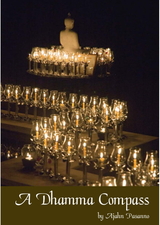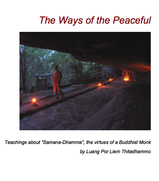“The Ways of the Peaceful” is one of the many possible renderings of the term “Samana-Dhamma”, an expression that summarizes the whole lifestyle of a Buddhist monk. “Samana” means somebody who is peaceful. Generally in the time of the Buddha all kinds of recluses, ascetics, contemplatives, and members of ordained communities living the life of a homeless practitioner (anagarika) were referred to as “Samanas”. The...
Mehr lesen
“The Ways of the Peaceful” is one of the many possible renderings of the term “Samana-Dhamma”, an expression that summarizes the whole lifestyle of a Buddhist monk. “Samana” means somebody who is peaceful. Generally in the time of the Buddha all kinds of recluses, ascetics, contemplatives, and members of ordained communities living the life of a homeless practitioner (anagarika) were referred to as “Samanas”. The Buddhas disciples were often called the “Samanas of Gotama” or the “Samanas of the Sakyan clan”, using the Buddhas family and clan names. Whenever the aspect of celibacy of these religious practitioners is stressed, the term “brahmacariya” is used, which translates in short as “Holy Life”. The Buddha himself called his monks “Bhikkhus”. This literally means beggars, but especially in the Thai Forest Tradition a second translation is popular: “Those who see the danger in the round of rebirth”. Besides the specific monastic code that the Buddha established for his monks (the “Vinaya”, with its 227 major training rules and countless minor rules), that spells out the conduct of a Buddhist monk in great detail, there was a general understanding of the etiquette, the virtues and qualities of a Samana, a peaceful ascetic. This is the “Samana-Dhamma”



